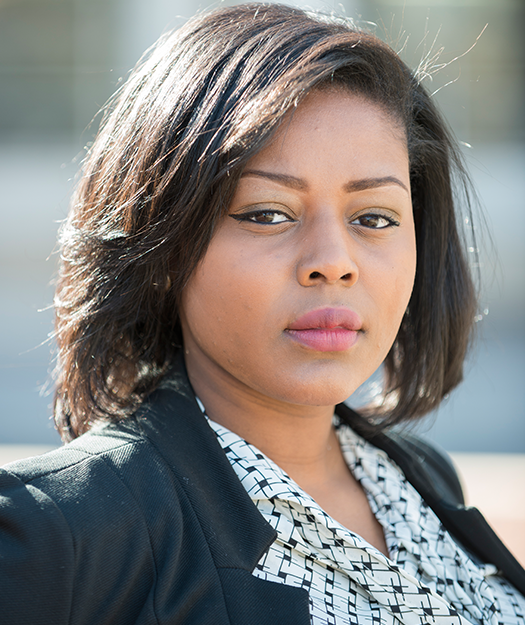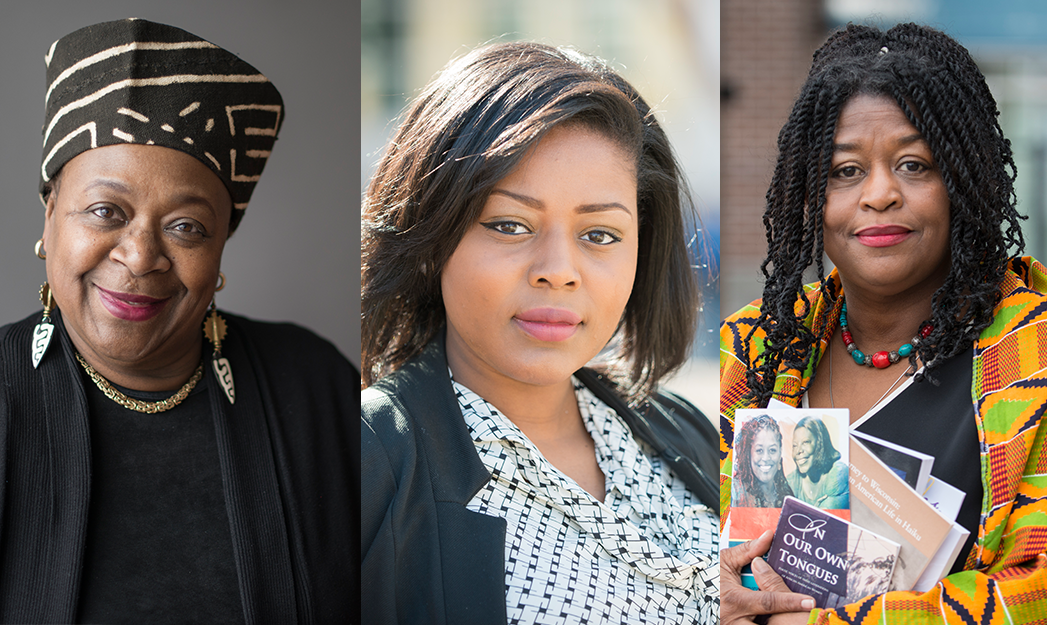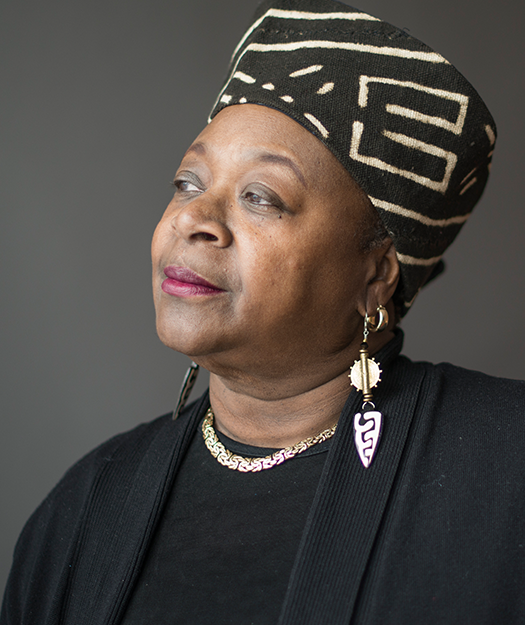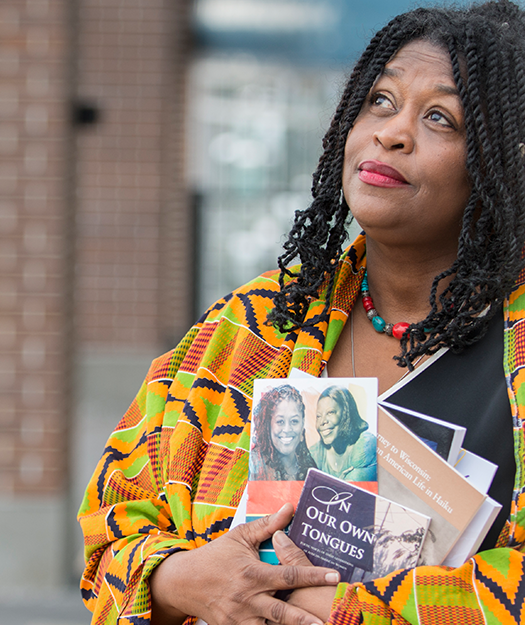LIVING IN DUALITY
Accomplished, inspired, yet feeling invisible outside the black community, four professional black women reflect on achievements, concerns and struggles—past and present— as they strive to make their mark.BARBARA FRANKS, LILADA GEE AND KEIVA COPPAGE-ARANDA each will tell you that, in varying degrees, their success belies the barriers black women face in the workplace and community: social, economic and education disparity, discrimination, less opportunity. Despite their accomplishments and talents, each woman will also tell you she often feels invisible.
Along with writing their stories, Fabu Phillis Carter, Madison’s poet laureate from 2008 to 2012, who goes professionally by Fabu, shares her own experience, the statistics she has hoped to overcome, and how she feels unseen in Wisconsin’s literary canon.
Each woman’s story reflects her passionate commitment to her work, her striving to make a mark despite the often-disturbing quantitative data on blacks in the workplace. They each deeply love their chosen professions, and have worked hard, and maybe even harder, to secure them. They remain committed to being their best woman selves and to helping African-American people.
They have had a positive influence on law enforcement, nonprofits and in academia. They are whole women, despite what they call the imposed duality of being largely unknown and unacknowledged outside their African-American community. Best of all, they are leaders who strive to change people and Madison every single day.
Even with that perspective and commitment, it’s hard to ignore what the numbers reveal. A 2015 report by American Association of University Women reveals a recent statistic indicating that in the workplace, even when African-American women have the same or better educational background as white American women, African- American women are not paid the same, nor do they receive equal benefits or career recognition. While it matters greatly for these women to be honored in their same ethnic community, when that same esteem does not translate throughout the entire Madison community, these women end up with much less in salaries, fundraising support and peer and professional recognition.
Barbara Franks | Gate Keeper for Justice
BARBARA FRANKS’ STORY IS ONE OF TRANSFORMATION. Believing in herself and her abilities, as a child, she decided she would overcome her family’s poverty, lack of education and negative experiences with law enforcement. Her tenacity served her well: Franks retires this year as the longest-tenured prosecutor in the Dane County District Attorney’s Office.
Raised by a single parent of 10 children, Franks, the oldest girl, cooked for her family at age 5 and was a second mother to her brothers and sisters. Her mother, who left school in fifth grade but later completed her high school equivalency exam, worked for minimum wages and long hours to provide for her children. Franks admits, “I didn’t have an easy life. We all had to grow up faster, be more responsible than you ordinarily would if you had two parents. I never considered whether I was happy or not. I did what I had to do.” She was determined to have better economic opportunities than her mother.
Growing up in low-income housing in Milwaukee, her first experience with police came one day when she and her brothers were walking home from the library, “”The police drove up on us fast, grabbed my brothers roughly and quickly threw them face down to the ground while they searched them. Someone in the area had stolen a purse. We were scared kids who ran home and told our mom. “They never apologized,” Franks says.
“This memory of black boys being treated disrespectfully was seared into her mind. Frank’s brothers didn’t do well without a caring male figure to emulate and eventually as juveniles and adults got in trouble with the law. Her brothers, and their experiences as they grew into adulthood, were Franks’ biggest influence to enter the legal profession.
Another motivation came three jobs after her graduation from UW-PlaTheville. Employed at the Wisconsin Council on Criminal Justice, where she worked for 12 years as a state employee, Franks says she was “bumped” out of her position by someone from another agency who had no experience in the field. Her ouster further fueled her desire to enter the UW’s law school; having her credentials questioned by a supervisor later in her career bolstered her resolve to build a remarkable legal career.
Recalling her law school days Franks says she was determined, “I wasn’t afraid to go to law school, because I was a woman on a mission. I had seen too much and too many people suffering from the system.” Franks graduated in 1986.
She became prosecutor when the district attorney’s office actively recruited for diversity, “There, says Franks, she felt what she calls the “connection and understanding that I had with the offenders” was a plus in her job, though she says her supervisor found it a minus. While Franks understood the poverty many offenders came from, which was like that of her family, she also wanted to be a role model and proof that you could overcome poverty in legal ways. She brought those sentiments—to get beyond sentencing people without any understanding of their circumstances—to the job.
She says that, in her experience, African- Americans have not sought to become prosecutors because of a misplaced belief that the role is part of an unfair system. Franks, however, defines the role as being “the gate keeper for justice.” Following that responsibility, one of her proudest accomplishments was coordinating Dane County’s disproportionate minority contact and confinement initiatives, which analyzed the system from police contact and policies to procedures and practices that adversely affected youth of color, “This work was the blueprint to address the over-representation of youth of color in the juvenile justice system.
Everett Mitchell, a former assistant district attorney, who is currently community relations director at UW-Madison, recognizes Franks’ impact in the maledominated legal field. “She is a fearless advocate for children and diversity in the criminal justice system. Her work has caused many children and families to retain a sense of trust in a system that often seems disconnected and unconcerned. It was a privilege to work with her and to realize that her work was the foundation for all those who think of prosecution as a life profession.”
Lilada Gee | Social Innovator
LILADA GEE IS A SOCIAL ENTREPRENEUR-an individual with innovative solutions to society’s most pressing social problems. She defines herself equally as an activist from Generation X, known for its embrace of diversity, societal change and the highest education and volunteerism levels, and the generation of African- American women who push for equal rights and recognition. Her bachelor’s degree from UW-Madison covers majors in Afro- American studies, psychology and education, and helped prepare her for a career in social work. Gee, who is well known locally and nationally for her work with sexual abuse victims, created Lilada’s Living room, a non profit that provides a safe place and culturally specific tools to help African-American women survivors. Gee has offered Afro-centric services to African-American girls and women in the Madison community for decades through organizations and programs including Nefertiti, “The Debutante Cotillion and Career Day—all of which she founded—and an abstinence curriculum she developed for African-American girls.
Especially in a field—the non profit sector—that has a majority of African-American clients, she wonders, where are the wellknown or well-paid African-American women leaders? Gee says she has grave concerns about their glaring absence. “Madison is quite committed to serving black children, but not quite as committed to empowering black leadership to serve black children.”
Gee believes that “cultural competence,” a term to describe the ability and even training to interact with people of other cultures or socioeconomic backgrounds, is an artificial construct. As such, she believes it’s designed to remove African-Americans from being the necessary problem solvers to the difficulties that being black in Madison brings. According to Gee, cultural competence assumes that African-American culture, traditions and values can be learned by anyone or even worse, are unnecessary to improving people’s lives, “This construct, she maintains, removes the necessity of having African-Americans as role models and the necessity for organizations and businesses to diversify their workforce.
While adults and teenagers alike say Lilada’s Livingroom programs have helped them heal, Gee continues to struggle with funding her programs. Most of the funding for Lilada’s Livingroom comes from an out-of-state foundation, not Madison donors. Her non profit’s fund-raising difficulties mirror those of most non profits nationwide led by people of color, with one study by the Greenlighting Institute reporting that as little as 3.6 percent of all foundation dollars are granted to minority-led organizations.
Tamara Brown, Lilada’s Livingroom board member and owner of Fringe Spa Salon feels strongly about Gee’s community support and impact. “Lilada Gee is a key leader in Madison because she advocates for a population in our community that has been silenced. Due to her work, many girls and woman can live freer, yet funding for this critical work remains scarce in Madison,” she says.

Keiva Coppage-Aranda | Alone in academics
KEIVA COPPAGE-ARANDA REPRESENTS THE DAUGHTERS and granddaughters of all these women who seek better lives, equal pay and equal regard. Coppage-Aranda felt her share of heartache as a child, moving between her mother’s home in the Midwest and her father’s home in the South. “It was kind of like growing up in two worlds. My mother had no career and struggled financially and my father had a successful career and was financially independent.”
Even with the lack of resources, her mother had great expectations for her daughter and insisted that she do well in school. Coppage-Aranda was always exceptional in mathematics and science, with a maternal grandmother who taught her to read at 4 and who gave her telescopes and microscopes instead of dolls and toys.
Like Franks, Coppage-Aranda determined as a child that she was going to be successful and that education would be the path to her success. She participated in the King/Chavez Program, Upward Bound, and other TRIO programs that further prepared her for the university and offered her summer research projects. As an undergraduate at UW-Whitewater, Coppage-Aranda authored a publication and a patent in 2010 for surfactants that can be used for water desalinization and other chemical separations. She graduated in 2012 with a bachelor’s degree in chemistry.
Her next goal is to earn a master’s degree in environmental engineering this year. Coppage-Aranda is among 32 women in her department getting master’s and doctorate degrees—and the only African-American in environmental engineering, a fact that makes her feel all the more isolated. One strong supporter is Malissa Givhan, who is also the only African-American woman in her department, urban planning, transportation management policy concentration. Givhan says, “I respect the ways that Keiva interacts with people as kind and professional. She has a business perspective and is always thinking of ways to make life better for people.”
Coppage-Aranda admits that she has greater opportunities than most African- American women, but says work and professional development are like being inside a pressure tank. “People are quick to attack your ideas and attempt to convince you will not be successful,” she says.
Coppage-Aranda, now married with a newborn daughter, has extra drive and is more persistent in achieving what she wants for her life. Her family is her inspiration, she says, driving her to continue until she makes a significant impact in her field—and in her community.
Fabu | Invisible Writer
I HAD JUST COMPLETED THE SECOND OF TWO master’s degrees: one in African languages and literature and the second in Afro-American studies and as a young woman, I felt on top of the academic world. I congratulated myself on my love of learning and solidifying my financial future by graduating despite the frozen white winters of Wisconsin and the equally frigid welcome at UW-Madison. “ttere were very few African – American graduate students, no assistance in connecting with other African-Americans on campus or in the community, no directories of cultural services, African-American businesses, restaurants and the like. In general, I was hundreds of miles away from home, dropped off in a predominantly white culture and on my own.
Yet, I was largely happy until I read the 1981 U.S. Census analysis that a white man with a high school education and a factory job would make more money in his lifetime than I would in mine. Leaving for Nairobi, Kenya, to start my research in Kisii oral literature, I was sobered by the fact that as an African-American woman, my love of learning had to be reason enough for a professional career because the money would not follow.
“The Simple Truth about the Gender Pay Gap,” a spring 2015 report from the American Association of University Women, states that today race still affects the gender wage gap and that the latest data indicates that gap is worse for women of color, “There has been very little change to the wage gap between African-American women and what other women and men earn, “The pay gap affects all women, but it doesn’t affect all women equally. Asian-American women and white women have higher weekly take-home pay than African-American women. Compared to white men, who remain the largest group in the workforce, African-American women fare even worse, earning only 64 percent of a white man’s salary, while Hispanic women experience the largest gender and race pay gap, earning only 54 percent of a white man’s salary.
Type of employment chosen, years in the workforce, personal choices to leave the workforce for a time, such as to raise children, age and discrimination, whether overt or implicit and even education are cited as causes for gender pay gap. “The many factors contribute to the gender wage gap, which occurs at every level of education. Labor statistics also indicate that African-Americans are still paid less than their white peers even when they have the same educational background. Moreover, women of color may experience a double pay gap— earning less money than both white men and women.
As an African-American living and working in Madison for several decades I am also a part of this maddening duality, one in which people stop me on the streets in my community to congratulate and acknowledge me as a poet and writer, often talking with me about a specific poem or my words in a column. Yet when Madison or Wisconsin writers are cited, it seems African-American writers are usually not included, with only sporadic inclusion of African- American poets in UW-Madison’s creative writing department, as was the case in a 2012 article on Madison in Poets and Writers.
I am in the same unrevealed company with the great Jean Toomer (1894- 1967), a Harlem Renaissance writer, who wrote the literary classic,“Cane,” a poetry collection and a novella. Toomer also attended UW-Madison and also is seldom connected in any way to Wisconsin. His time here was, it seems, invisible. Even in my work as Madison poet laureate, a position that recognizes service to both poetry and to the community, I feel unknown beyond my community.
I take wisdom from the three other women highlighted in this article: Like Franks, I will outlast my critics. I’ll be as outspoken as Gee about inequalities and always understanding like Coppage- Aranda that I have family, community and faith to keep me centered and ever creative.
But really, should that be enough— should that be all?





